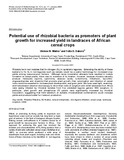| dc.description.abstract | Rhizobia form root nodules that fix nitrogen (N2) in symbiotic legumes. Extending the ability of these bacteria to fix N2 in non-legumes such as cereals would be a useful technology for increased crop yields among resource-poor farmers. Although some inoculation attempts have resulted in nodule formation in cereal plants, there was no evidence of N2 fixation. However, because rhizobia naturally produce molecules (auxins, cytokinins, abscicic acids, lumichrome, rhiboflavin, lipo-chito-oligosaccharides and vitamins) that promote plant growth, their colonization and infection of cereal roots would be expected to increase plant development, and grain yield. We have used light, scanning, and transmission electron microscopy to show that roots of sorghum and millet landraces from Africa were easily infected by rhizobial isolates from five unrelated legume genera. With sorghum, in particular, plant growth and phosphorus (P) uptake were significantly increased by rhizobial inoculation, suggesting that field selection of suitable rhizobia/cereal combinations could increase yields and produce fodder for livestock production. | en |

